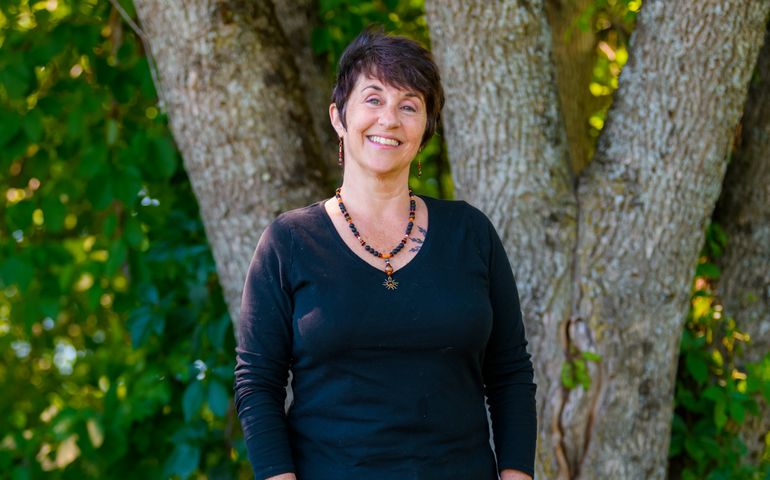
Central Maine startup stories: A regional roundup of 5 new businesses
 Photo / Jim Neuger
Katt Tozier, founder of Bless Your Body, photographed on the banks of the Kennebec River in Winslow.
Photo / Jim Neuger
Katt Tozier, founder of Bless Your Body, photographed on the banks of the Kennebec River in Winslow.
From a digital marketplace for collegiate art to snail-mail greeting-card kits for older individuals, central Maine is a hotspot for new businesses. Many are in Waterville, which is home to Colby and Thomas colleges, Bricks Coworking and Innovation Space, and Tortoise Labs, which works with entrepreneurs of all stripes (see sidebar). Kennebec Valley Community College also has two campuses, in Fairfield and Hinckley.
Why so much startup activity in the region and Waterville in particular? Mike Duguay, executive director of the Harold Alfond Institute for Business Innovation at Thomas College, chalks it up to a multi-tiered ecosystem.
“Right now, entrepreneurs have the ability to plug into services at three distinct stages of a startup: the idea, the incubator and the accelerator stages,” he says. “Other areas of the country may have one or two of those stages covered, but in my experience, it is very rare to find an area that has all three.” Couple that with statewide resources including the “Greenlight Maine” business-pitch television series and the Maine Technology Institute, “and you immediately have an incredibly robust support network and suite of offerings for entrepreneurs.”
Here are five founders who shared their stories with Mainebiz.
Blazing trails for winter ‘weekend warriors’

As Jake Warn gets ready to start his senior year at Thomas College, the entrepreneurship/small business major has big plans for his own small business after winning the $10,000 “Greenlight Maine Collegiate Challenge” pitch contest.
His company, called SledTRX, offers an online planner for snowmobilers. It’s a map of trails across the state, along with sled shops and places to get food and gas and spend the night along the way. The 21-year-old came up with the idea in his first semester of college.
“I had been a long-time snowmobiler myself,” he says, “and I was always aware of how people struggled to find information. I found it funny that at every trail head there’d be a fleet of snowmobiles trying to figure out where to go.”
That’s because while there are a lot of maps on paper, online resources are few and far between — owing in part to the fact that 90% of Maine’s land is private.
Using data from multiple sources, Warn crafted a map he offers for free online. He gets advertising revenue from local businesses, some of which are seasonal. Warn says they appreciate the opportunity to connect with customers in an industry that contributed more than $600 million to Maine’s economy in 2019, according to a 2020 study by University of Maine researchers.
Warn describes his target market as snowmobile “weekend warriors” from Maine and out of state who ride every weekend during the season, which runs from January until March or April depending on the weather. Much to Warn’s surprise, some 8,000 people visited the SledTRX site in January and February.
Next steps include developing a GPS-based map and eventually developing a similar map for ATV trails as well. Warn, whose interest in starting his own business goes back to high school, says he’s made a lot of useful connections at Thomas College to make that happen.
Outside of classes, Warn is a member of the school’s entrepreneurs club, which he joined “the minute he set foot on campus” according to Mike Duguay, executive director of the Harold Alfond Institute for Business Innovation.
As for Warn’s current endeavor, Duguay says, “Jake has an uncanny ability to see a problem from the customer’s vantage point and continue to refine how he might solve it until it’s the perfect fit for the customer. I believe Jake’s willingness to see the situation through his customer’s eyes, along with his high level of intellectual curiosity, is his superpower as an entrepreneur.”
Telehealth wellness coaching
At 57, Katt Tozier is a seasoned entrepreneur and part-time college student about to start her next venture, a virtual wellness business called Bless Your Body.
Well-versed in virtual services long before the pandemic, she shifted her latest business plan after opening a bricks-and-mortar holistic wellness center in Waterville on Feb.1, 2020 — only to have to close it a few weeks later.
She’s starting Bless Your Body with her three grown daughters, with a focus on stress management including what Tozier refers to as “intelligent nourishment.”
“Before the pandemic, the idea of personalized wellness and bio-individuality and telehealth was starting,” she says. “The pandemic has moved those things forward way faster than I believe they would have otherwise.”
That includes treatment for mental and emotional health, she says, noting, “People recognized just how vulnerable they really were. Now people are embracing a whole different way of wanting to interact with health and wellness professionals.”
Tozier’s career path to health and wellness has been a long and winding one, decades after she was a stay-at-home mom on a military base looking for an outlet when she started selling Tupperware and discovered she had a knack for it, working her way up to executive manager.
Later after a divorce, she left a minimum-wage bank job to start a one-person medical transcription business serving local doctor’s offices and hospitals; she learned the terminology first by studying Stedman’s Medical Dictionary.
When electronic medical records became more widespread and demand for her services waned, Tozier retired from that activity in 2014.
Confronting her own past as a victim of childhood violence eventually led her to explore holistic wellness as a means to heal herself as well as others, and to take psychology classes at Kennebec Valley Community College and enroll in the school’s Institute for Integrative Nutrition.
“I wanted to take 20 years’ worth of lay knowledge,” she says, “and wrap it up in a nice, neat bow with the certification process.” She’ll take more psychology classes this fall as she looks forward to embarking on her next chapter as an entrepreneur with the telehealth business she’s launching with her daughters.
All four will offer coaching services for clients. Tozier also plans to do live streams, webinars and social media posts for a wider audience, saying, “I will have my hands full.”
Showcasing and selling collegiate art
As art sales took off worldwide during the pandemic, a student-run online marketplace for college artists was launched in Waterville.
The Cubby is the brainchild of Josh Kim, a product design and sociology major at Colby College, and fellow rising senior Matteo Cugno, a mechanical engineering major at Worcester Polytechnic Institute in Massachusetts.
They started out selling textbooks, fridges and other college necessities through a site called Sklaza, then switched to art and a new name to reflect the “young childish energy” they wanted to project: The Cubby.

It sells one-of-a-kind pieces by emerging artists at an affordable price, and claims to be the first marketplace where artists get 100% of the proceeds — and makes its money from companies advertising on the site to reach Generation Z consumers.
The site lists around 600 artists and has around 2,500 users so far. The team continues to grow, now at six with the recent hiring of Heeya Mody, a rising junior at the Parsons School of Design in New York, as creative director. Kim had contacted her about selling her artwork on the platform before offering her a job.
“It was wonderful to see a platform that’s not just another corporation that values themselves over their audience, but rather one that actually celebrates their users and cares about their artists,” Mody says. “Knowing this and seeing the posting about the creative director position opening, I knew I had to be a part of this initiative.”
Kim won the Maine Center for Entrepreneurs’ Top Gun contest this May and was named the Central Maine Growth Council’s 2020 Emerging Leader of the Year.
The Cubby now aims to scale up by partnering with social media influencers on TikTok and Instagram; using public relations to build wider name recognition; and looking at partnerships with other companies and brands.

Kim, who makes pottery as a creative outlet, hasn’t yet shown or tried to sell his work online. He also prefers the term “maker” over “entrepreneur,” saying: “I definitely like to think of myself as somebody who will make things the rest of my life, whether that’s a startup or business venture or pottery or music.”
Taking older adults down memory lane
Tiffany Lomax moved from Delaware to Waterville last year to take a job as Colby College’s first recreation services director.
She also became a first-time entrepreneur, teaming up with her sister and aunt to launch Memory Lane Cards LLC in February. They make fill-in-the-blank card kits for older adults, inspired by concern for Lomax’s 96-year-old grandmother.
Unable to socialize with friends during COVID, the grandmother often forgets to call them, and gives a standard answer of “fine” when family members call to ask about her day.
That’s when Lomax and her sister, Judie, a psychologist and their grandmother’s primary caretaker, came up with the idea of pre-printed cards with prompts like “Do you remember when…” and “Here’s a photo of…” The goal: To bring back memories, and help her reconnect with family and friends.

“We were like, ‘How do we create more of those moments where she gets to remember the good times and gets to talk to her friends,’” Lomax says, who notes that the cards were an instant hit with her grandmother: “We give her the prompt and she can give us the whole story.”
Seeking to bring the same experience to others, Lomax and her sister and aunt teamed up to launch Memory Lane Cards with an ecommerce site. For $20, customers get a kit with three fill-in-the-blank cards with prompts asking for a word or two, a phrase or sentence depending on the person’s cognitive level; three detachable photographs that the person submits; three stamped envelopes; and a set of easy-to-follow instructions. Each card concludes with the sender’s name and phone number, so that the recipient calls or replies in writing.

With help from Tortoise Labs, Lomax designed a website that touts “snail mail with a new twist” as the perfect gift for older loved ones. She reports a positive response so far and looks forward to the company’s next chapter, saying, “I’m excited to see where we can go.”
Peddling ‘the write stuff’ to small businesses
When Elaine Theriault-Currier started writing press releases for small-business clients in 2020 while working at the Maine Department of Labor, she never thought she’d go into business for herself.
For a combination of reasons including the pandemic and having to care for her six-month-old daughter for whom she couldn’t find day care, she stayed in her day job while taking on some writing gigs in her spare time.

“I wasn’t that prototypical bachelor entrepreneur who stays up until all hours,” she says. “Instead of working until midnight, I was breastfeeding my daughter.” As a result, she wasn’t aggressively seeking new clients.
That changed early this year when she decided to take the plunge only when it made financial sense to do so, which happened sooner than expected in April. She left her state government job that month and started full-time on her own in May.
Her company, called Pen Name and based out of her home in Windsor, offers public relations and grant writing services for small businesses.
Currently working with several food-based businesses, she hopes to expand that niche in the longer term. But she’s determined to stay a one-person operation and keep her focus on writing rather than managing others and editing their work.
“I don’t want to get away from what I love,” she says.















0 Comments